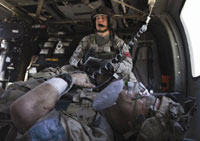Office of Research & Development |
 |


Working in partnership, VA and the Department of Defense (DoD) plan to invest more than $100 million in new research to improve diagnosis and treatment of posttraumatic stress disorder and mild traumatic brain injury.
The research will be conducted under the framework of two consortia—groups of investigators— that will be coordinated jointly by VA and DoD.
"PTSD and mTBI are two of the most prevalent injuries suffered by our warfighters in Iraq and Afghanistan, and identifying better treatments for those impacted is critical," said DoD's Jonathan Woodson, MD, assistant secretary of defense for health affairs. "These consortia will bring together leading scientists and researchers devoted to the health and welfare of our nation's Service members and Veterans."
The Consortium to Alleviate PTSD will focus on:
The Chronic Effects of Neurotrauma Consortium will conduct research on TBI. Among the areas to be studied:
Each consortium will have a coordinating center and various study sites. The groups will include DoD and VA investigators along with collaborators from universities, nonprofits, and private industry. DoD expects to award some $20 million to fund the PTSD consortium and another $37 million for the TBI group, to last over five years. VA will supplement those amounts with awards totaling up to $50 million over five years—$5 million per year for five years for each topic. The VA money will support VA investigators working within the consortia.
The funding initiative follows a meeting held in late 2011 between the agencies to jointly review their research and boost collaboration. The new effort is also in response to an August 2012 presidential executive order calling for enhanced access to mental health services for Veterans, Service members, and military families, and more coordination of federal research in this area.
Theresa Gleason, PhD, a scientific program manager for VA, says the collaboration between VA and DoD also grew out of "recognition of the need to strongly coordinate efforts in this area, and a great hope that combining resources would exponentially advance science."
Details on the consortia—including funding information for qualified investigators interested in submitting proposals—are available at www.grants.gov and the website of DoD's Congressionally Directed Medical Research Programs, http://cdmrp.army.mil.